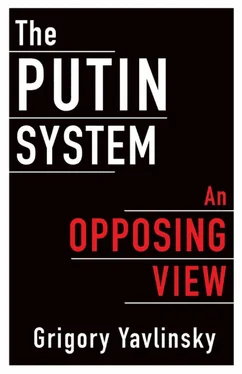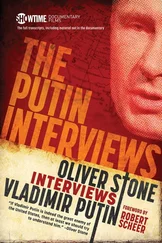All the government rhetoric about the need to privatize large government holdings in the banking and resource industries, however practical this rhetoric might have seemed at times, have remained empty talk. This shows the steadiness of the authorities’ policy of control over all those resources that could be put to political use by others. Moreover, during the first decade of the century, the state’s directly or indirectly controlled share of cash flows tied to the banking sector and resource industries (virtually the only two truly significant streams of money in the Russian economy) has ostensibly grown in size.
The reason for the continuous postponement of the privatization of these two sectors is exclusively political, as there is no practical economic or even ideological rationale for delaying it. Preventing politically ambitious groups other than themselves from using the resources of banks or big resource companies to fuel their own growth has been the primary concern of the upper crust of government bureaucracy. And maintaining a direct government grip on the largest corporations in these two sectors reduces the likelihood that some part of the cash flows they control might be used for political activities that have not been approved by the federal government, or for activities that directly confront the government’s interests and goals.
Herein, too, lies the most likely explanation for the failures to launch political campaigns using private financial fortunes, even when the initiators of those projects were extremely cautious and deferential to the system. Even though, as a rule, such endeavors were initiated by and undertaken with the consent of members of the ruling circle, sooner or later (and usually fairly soon) these budding politicians tended to fall prey to palace intrigues and ended up being shut down by external pressure before gaining any traction. And the real reason for this is not the lack of funds or organizational talent but rather that the logic of an authoritarian power does not leave any room, in principle, for even concealed, undercover competition for the place that is held by the ruling group.
Having placed domestic sources of political funding under its control, the Kremlin became more active in its efforts to block attempts to use foreign funds for this purpose. These foreign sources had in fact been placed under government watch and partial control previously, but it was finally done openly and in public in 2012. New laws created the official status of “foreign agent” as well as special reporting and accountability procedures for nongovernmental nonprofit organizations that were funded from abroad and whose activities had a political dimension. At the same time, a government-issued regulation blocked any research institutions and teams from obtaining foreign grants without government sanction.
Finally, this array of measures was complemented by the law that prohibited legislators and high-ranking officials (that is, all those members of Russia’s elite who were potentially capable of initiating political or related activities without government consent, or of becoming deeply involved in such activities) from having bank accounts or other financial assets outside of the country. Even though, formally speaking, the law is intended to shield influential government officials from potential vulnerability to foreign influence, in reality this so-called nationalization of the elites is an effective means of control over the possibility that some government officials might fund political activities out of the government’s view—regardless of any foreign interests whatsoever. The fact that the passing of this law coincided with other actions intended to block autonomous sources of funding for political activities suggests that the Kremlin’s primary concern in passing this law was not the risk of manipulations on the part of foreign intelligence agencies but rather the threat presented by autonomous political activities within the elite but outside of the control of the ruling circle.
As a result of these government-initiated moves, any individuals or groups with political ambitions who aren’t sanctioned and controlled by the authorities cannot count on any significant financial support, at least within the current legal framework. This certainly makes it much easier for the ruling circle to achieve its goal of maintaining its monopolistic grip on power. It also makes it unnecessary to resort to outright criminal prosecution of oppositionists—except for those inclined to take part in boisterous street actions with sometimes unpredictable consequences.
Naturally, in real life things get more complicated. Government control is not always absolute, while human imperfections drive the system or its individual representatives toward excessive cruelty, toward carrying the persecution of its opponents beyond what would be rational from its own point of view. Yet, overall, the ruling circle’s control over key assets and cash flows in the economy is quite effective in performing its function of maintaining the “political stability” as they envision it.
As mentioned, the other instrument used to ensure the ruling circle’s monopolistic grip on power is its tight hold upon the tools of influence over the mass consciousness. At present, the most important among these tools are nationwide TV channels and regional mass media. Taken together, these outlets, to a great extent, shape the perceptions of a very large number of Russian adults about the world around them, and they play a decisive role in programming citizens’ social and political behavior.
This certainly does not mean that people accept as an article of faith everything that is foisted upon them by these media. Much of it, and first and foremost the propagated image of the government as the defender of the people’s interests, is viewed by a great many people with much skepticism and even scorn. Mass opinion of officialdom and of the moral character of the ruling bureaucracy, including its top brass, is widely known. It is not an appreciative view, to put it mildly, whatever the official media might say. However, the single most important goal of the authorities turns out to be fully achievable—imposing their information agenda upon the country and thus identifying linchpins in the mass consciousness upon which the relative political security of the ruling circle can be anchored. [1] This aspect of the situation is rarely mentioned, and yet it is critically important. The authorities cannot completely protect themselves against scathing critiques and outright invective. Mass access to the internet makes this physically and technically impossible—as developments in China have demonstrated, controlling discussions on the internet is not feasible even with much more rigid and effective surveillance of the population. Therefore, manipulating public opinion becomes the most potent means of counteracting criticism. Major mass media as well as the “niche” opposition outlets largely neutralize critics of the system by pushing to the fore issues and stories that appear inconsequential or preposterous to most of the country’s population. This may be done either intentionally or because of the outlets’ extremely low professional standards. The achievement of this goal is further simplified by the attitudes of a large part of the opposition-minded intelligentsia: viewing themselves as part and parcel of the global (Western) elite, they feel that they don’t have to take into consideration the needs, beliefs, tastes, and prejudices of the bulk of the population (which they brand “bumpkins,” “rednecks,” and holdovers from the Soviet era). As a result, instead of presenting issues that might animate the masses (such as the condition of the social safety net, the performance of the judiciary and law enforcement agencies, health care, and education), the agenda of the system’s critics gets filled with discussions of the personal ups and downs of individual oppositionists, infringements upon individual artists’ freedom of creativity, and other stories that cause a mixed and skeptical response among the depoliticized majority of Russians. The role of the politicized intelligentsia of Moscow and Saint Petersburg in the emergence, development, and consolidation of the system of peripheral authoritarianism in Russia deserves a separate and fairly blunt appraisal.
Читать дальше












